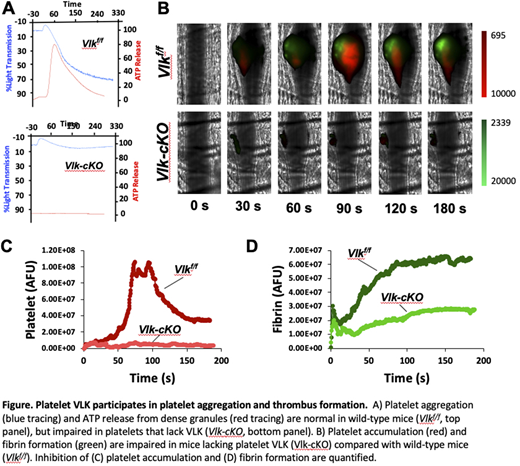Tyrosine phosphorylation of proteins secreted into the extracellular space has been observed in cell cultures and in vivo, yet little is known about the role that phosphorylation of extracellular proteins serves in modulating cell function. An important reason for the gap in our knowledge of the functional significance of extracellular protein phosphorylation has been the delay in identifying extracellular kinases. Within the last decade, however, bioinformatic strategies to identify kinases with signal peptides, coupled with biochemical approaches to characterize kinases in the secretory pathway, have described several kinases that phosphorylate secretory pathway and extracellular substrates. Of the known kinases containing signal sequences, Fam20B and VLK have been identified in platelets. VLK has been identified as a broadly expressed secretory pathway tyrosine kinase secreted from platelets in an activation dependent manner. Its role in platelet function, however, has not been previously studied. To understand the contribution of tyrosine phosphorylation of secreted factors and extracellular domains of transmembrane proteins in platelet function and thrombus formation, we generated mice whose platelets lacked VLK. Mice with megakaryocyte/platelet-specific VLK deficiency (Vlk-cKO) exhibited normal platelet abundance, volume and morphology, and tail clip bleeding times, but showed dramatic changes in platelet function in vitro and in vivo. In vivo, platelet accumulation was reduced by 90% in Vlk-cKO mice compared to control (Vlkf/f) littermates (P = 0.02) following laser-induced injury of cremaster arterioles (Figure). Likewise, fibrin generation was reduced in mice lacking platelet VLK by 62% (P = 0.009). In vitro, evaluation of resting and thrombin-stimulated VLK-deficient platelets demonstrated a significant decrease of several tyrosine phosphobands compared to control. Platelet function testing of VLK-deficient platelets (Figure) showed decreased platelet aggregation in response to stimulation with 100 µM AYPGKF, a PAR4 agonist, (Vlkf/f: 70+5.1%; Vlk-cKO: 23+8.0%) or 4 µg/mL collagen (Vlkf/f: 53+2.5%; Vlk-cKO: 27.5+2.9%). Dense and α-granule release in response to AYPGKF were also significantly decreased in platelets in which VLK had been silenced. In contrast, Vlk-cKO platelets aggregated normally in response to either 10 µM, 40 µM, or 100 µM ADP, and the aggregation defect in response to low doses of AYPGKF was reversed by subthreshold concentrations (2.5 µM) of ADP. Furthermore, stimulation with high-dose 150 µM AYPGFK or 5 U/ml thrombin resulted in comparable platelet function and ATP secretion in control and Vlk-cKO platelets respectively, ruling out a storage pool defect. Taken together, these results suggest that a dense granule secretion defect contributes to the decrease in platelet aggregation observed in platelets in which VLK is absent. In human platelets, tyrosines phosphorylated in secreted and extracellular domains of transmembrane proteins implicated in the regulation of platelet function were identified by mass spectroscopy analysis. Extracellular proteins or proteins with phosphosites that mapped to extracellular domains included ectonucleoside triphosphate diphosphodydrolase 6 [ENTPD6], platelet basic protein, integrin αIIß, and multimerin-1. These studies demonstrate that the secretory pathway tyrosine kinase VLK is critical for stimulus dependent platelet aggregation and thrombus formation, and provide the first evidence that secreted kinases contribute to platelet function.
De Ceunynck:Sanofi: Current Employment. Dilks:PlateletBiogenesis: Current Employment. Peters:PlateletBiogenesis: Current Employment. Noetzli:Anylam: Current Employment. Rosen:Keros Therapeutics: Membership on an entity's Board of Directors or advisory committees. Italiano:PlateletBioGenesis: Consultancy, Current equity holder in private company, Membership on an entity's Board of Directors or advisory committees, Patents & Royalties, Research Funding. Flaumenhaft:STRM.Bio: Membership on an entity's Board of Directors or advisory committees; PlateletDiagnostics: Consultancy, Membership on an entity's Board of Directors or advisory committees, Patents & Royalties, Research Funding; QuercisPharma: Membership on an entity's Board of Directors or advisory committees.
Author notes
Asterisk with author names denotes non-ASH members.


This feature is available to Subscribers Only
Sign In or Create an Account Close Modal